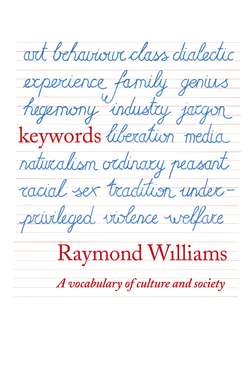Читать книгу Keywords: A Vocabulary of Culture and Society - Raymond Williams - Страница 18
BUREAUCRACY
ОглавлениеBureaucracy appears in English from mC19. Carlyle in Latter-day Pamphlets (1850) wrote of ‘the Continental nuisance called “Bureaucracy”’, and Mill in 1848 wrote of the inexpediency of concentrating all the power of organized action ‘in a dominant bureaucracy’. In 1818, using an earlier form, Lady Morgan had written of the ‘Bureaucratie or office tyranny, by which Ireland had been so long governed’. The word was taken from fw bureaucratie, F, rw bureau – writing-desk and then office. The original meaning of bureau was the baize used to cover desks. The English use of bureau as office dates from eC18; it became more common in American use, especially with reference to foreign branches, the French influence being predominant. The increasing scale of commercial organization, with a corresponding increase in government intervention and legal controls, and with the increasing importance of organized and professional central government, produced the political facts to which the new term pointed. But there was then considerable variation in their evaluation. In English and North American usage the foreign term, bureaucracy, was used to indicate the rigidity or excessive power of public administration, while such terms as public service or civil service were used to indicate impartiality and selfless professionalism. In German Bureaukratie often had the more favourable meaning, as in Schmoller (‘the only neutral element’, apart from the monarchy, ‘in the class war’), and was given a further sense of legally established rationality by Weber. The variation of terms can still confuse the variations of evaluation, and indeed the distinctions between often diverse political systems which ‘a body of public servants’ or a bureaucracy can serve. Beyond this, however, there has been a more general use of bureaucracy to indicate, unfavourably, not merely the class of officials but certain types of centralized social order, of a modern organized kind, as distinct not only from older aristocratic societies but from popular DEMOCRACY (q.v.). This has been important in socialist thought, where the concept of the ‘public interest’ is especially exposed to the variation between ‘public service’ and ‘bureaucracy’.
In more local ways, bureaucracy is used to refer to the complicated formalities of official procedures, what the Daily News in 1871 described as ‘the Ministry … with all its routine of tape, wax, seals, and bureauism’. There is again an area of uncertainty between two kinds of reference, as can be seen by the coinage of more neutral phrases such as ‘business methods’ and ‘office organization’ for commercial use, bureaucracy being often reserved for similar or identical procedures in government.
See DEMOCRACY, MANAGEMENT
